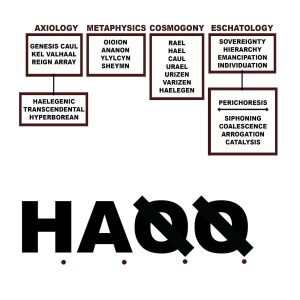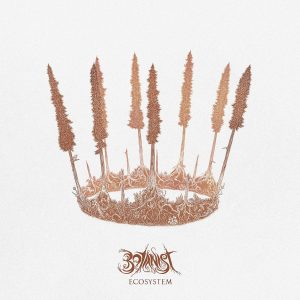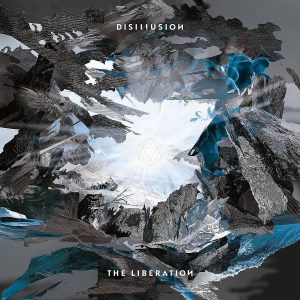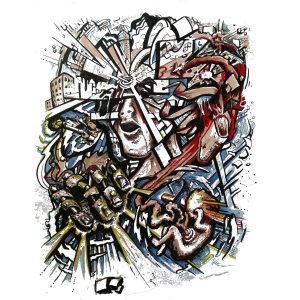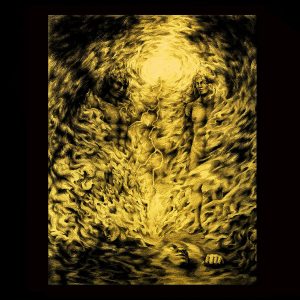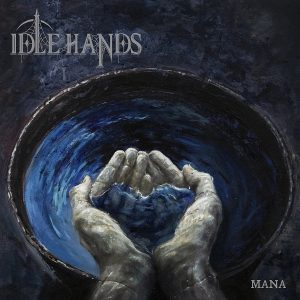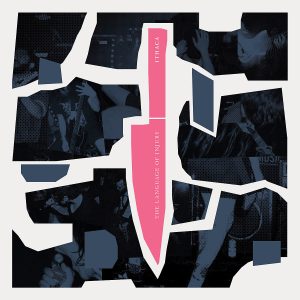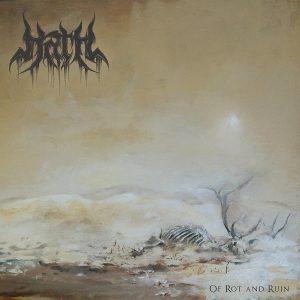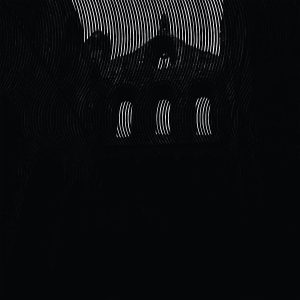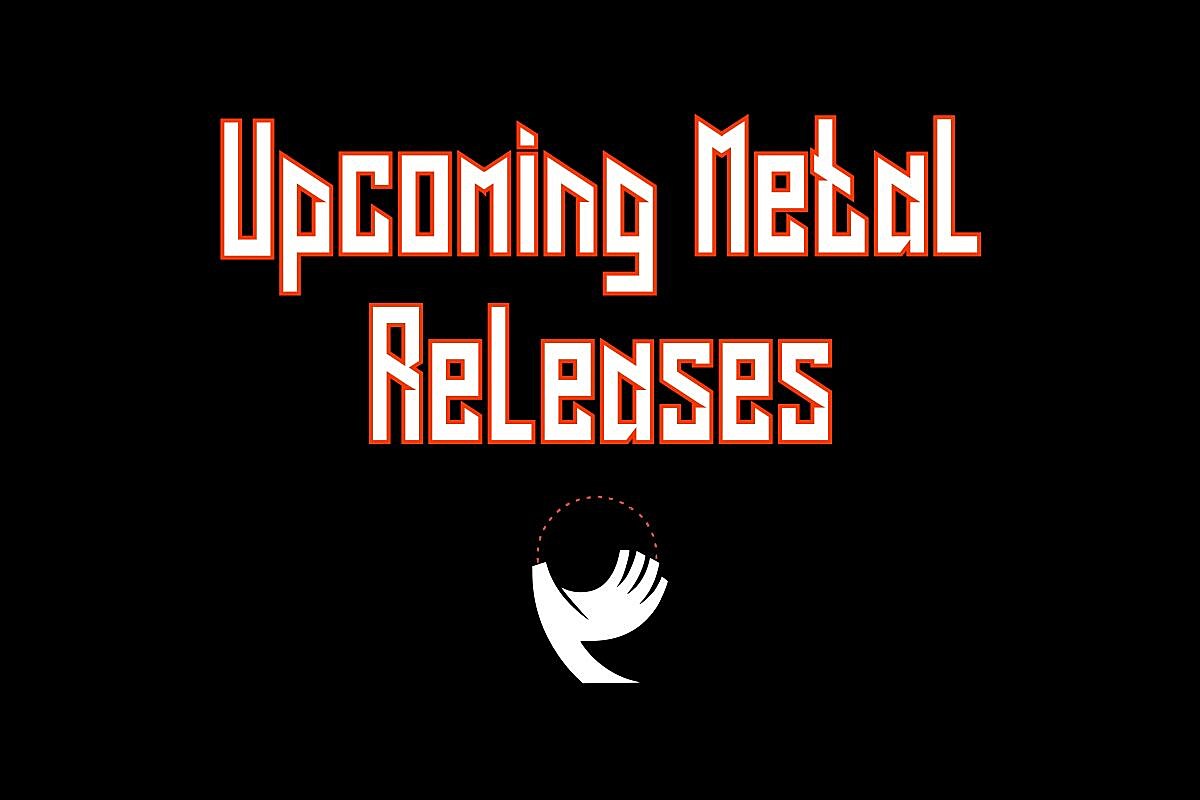
Here are the new (and recent) metal releases for May 14 through May 20. Releases reflect proposed North American scheduling, if available. Expect to see most of these albums on shelves or distros on Fridays.
See something we missed or have any thoughts? Let us know in the comments. Plus, as always, feel free to post your own shopping lists. Happy digging.
Send us your promos (streaming links preferred) to: [email protected]. Do not send us promo material via social media.
Upcoming Releases
Ghost — Phantomime | Loma Vista Recordings | Heavy Metal + Rock | Sweden
Ghost takes on a wide range of cover subjects on this new EP, which, while not their most interesting release (not a fan of covers EPs, honestly!), does provide fodder for some wild music videos. Embed below, but you’ll have to click through (NSFW, by the way).
–Ted Nubel
…
Frozen Soul — Glacial Domination | Century Media Records | Death Metal | United States
Everyone needs to be ecstatic about this new release from Frozen Soul. Those already in love with the band’s sound will get more of the same—furious guitars and riffing, old-school death with a hardcore flavor, and memorable hooks. Those who passed on the band previously, thinking they were a bit too simple or straightforward, should take a second listen because they really hone their craft on this one.
–Addison Herron-Wheeler
…
The Ocean Collective — Holocene | Pelagic Records | Progressive + Atmospheric Sludge/Post-Metal | Germany
Not ones to repeat themselves, the next chapter in The Ocean Collective’s discography comes with a heavier focus on synths; member Peter Voigtmann composed the keyboard parts first. Guitars and full-band instrumentation are still in play, however (so, not a Timewave Zero situation), and on Holocene, the band takes a bleak look at the current era of the world and just how much humanity is screwing it up.
–Ted Nubel
…
Botanist — VIII: Selenotrope | Prophecy Productions | Experimental Post-Black Metal | United States (San Francisco, CA)
Apart from keeping them off of Metal Archives until 2020, Botanist’s choice of using hammered dulcimers in place of guitars gives their albums a lush, rich texture that seems to build on itself, creating almost infinite depth. It’s from within these dark and lovely forests of sound that VIII: Selenotrope thrives, building melodies that resonate with natural splendor.
–Ted Nubel
…
Alcatrazz — Take No Prisoners | Silver Lining Music | Heavy Metal + Shred | United States (Los Angeles, CA)
Just from a statistical perspective, it’s extremely baffling to me that Alcatrazz continues to kick so much ass. The number of classic metal bands that came back after 35 year hiatuses and were better than before is, well… it might just be these dudes?
Anyway, Joe Stump’s guitar playing continues to rule and Doogie White’s vocals fit this heavily retro-aligned sound excellently.
–Ted Nubel
…
Blindfolded and Led to the Woods — Rejecting Obliteration | Prosthetic Records | Technical + Avant-Garde Death Metal | New Zealand
If you’re looking for relentless grind that doesn’t rely on the same old tropes and rather goes in a bold new direction with tons of varied influence, as varied a Aldous Huxley’s writing, even, we’ve got you. Or rather, Blindfolded and Led to the Woods have you covered with this new release. There is way more nuance here than I can do just to in a short blurb, but the TLDR version is definitely don’t sleep on this one; it’s weird and it’s heavy.
–Addison Herron-Wheeler
…
VHS — Quest for the Mighty Riff | Wise Blood Records | Death + Thrash + Grindcore | Canada (Thunder Bay, ON)
Few bands delight and surprise like VHS do. Their love of sci-fi, horror, and fantasy has always been, I suppose, nerdier, than most extreme bands will admit to, and it’s made every release delightfully self-indulgent. This latest one is a concept album centered around classic ‘sword and sorcery’ fantasy movies–and we’ve had plenty of those, but never one that sounded like this. The band’s high-energy mix of death, thrash, grind, and pure heavy metal rips through like an enchanted axe through evil sorcerer flesh.
–Ted Nubel
…
Sporae Autem Yuggoth — …However It Still Moves | Personal Records | Death + Doom Metal | Chile
There’s an exquisite sense of gloom behind this album; filth and horror almost take a backseat to the powerful depressive atmosphere. It feels a lot like witnessing something horrible unfold that you can’t explain, but also know you can’t stop.
–Ted Nubel
…
Charonyx — Persistent Soul | Independent | Thrash Metal | United States (Indianapolis, IN)
Packed with intricate riffs and bass-heavy grooves, Persistent Soul champions thrash metal’s technicality as well as its primal heart: expect gang vocals and exuberant choruses as well as dazzling shredding.
–Ted Nubel
…
The End of Six Thousand Years — The End of Six Thousand Years | Hypershape Records | Atmospheric Sludge + Melodic Death Metal | Italy
Eleven years after their last full-length, the Italian band returns with a self-titled EP that feels like a redeclaration of who (and what) they are. Across three new tracks, dissonant, sprawling riffs are lashed together by pummeling drums into something between death metal and post-hardcore, capped off by a Today is the Day cover.
–Ted Nubel
…
]]>
Botanist, by now, has made an impact — a real, measurable one, not only related to the genesis of “green metal” (whatever that is) but to the notion that you do not need distorted guitars to either be heavy or be metal. Or black metal, for that matter. And while what Botanist “is” is far less important a question than what Botanist “does,” the fact that we ask ourselves these questions in the first place means that, just maybe, project mastermind Otrebor is onto something special.
Clearly he is, and has been. Last year’s Ecosystem release showcased a Botanist brought full circle, enraptured in the prospects of the new but not absent-minded when it comes to prior material. This year’s Photosynthesis release carries on in much the same vein, albeit with some differences that Otrebor goes into in our interview below. It is 100% Botanist, but the project’s turn of late has involved a significant development in songwriting, production, and achieving that “full band” feel that so many solo projects aspire to obtain.
We’re stoked to bring you a new single “Oxygen” before the album’s Friday release. Enjoy the tunes, and check out our interview with Otrebor below.
…
…
How do you react to “black metal” versus “green metal” — clearly Botanist’s music is invested deeply in the natural world, does that investment also mean a change in style?
I don’t know if “green metal” is the chicken, and if the Botanist recording EP3: Green Metal is the egg, or the other way around, but someone started calling what Botanist does “green metal” before we could publish the EP, which we wanted to publish long before anyone else started calling Botanist “green metal.”
Botanist sounds like it does because it’s primarily made with dulcimers instead of guitars, and secondarily because it’s made with dulcimers that are written either by me, Otrebor, to drum tracks that either I or someone else wrote, or in a rare case, dulcimers written to drums that I wrote.
What about the dulcimer and its prominence in the music attracts you to the sound and experience it provides, especially as it relates to themes of Earth?
I play dulcimer because it’s the easiest and most intuitive melodic instrument to transpose my skillset as a drummer onto. In the early days of Botanist’s creation, the dulcimer worked super well with mirroring the way music formed in my head. Later, my personal relationship deepening with the hammered dulcimer showed me how it is the most intuitive conduit to my melodic creativity that I could ask for. That enabled me to branch out into other melodic instruments, including my voice, and develop those.
Do you envision or imagine your music in Botanist in terms of atmospherics? You mentioned melody – dulcimer as melody vis-à-vis percussion, even – and I wonder what relation melody has with Botanist’s atmosphere, especially as of late. Sometimes atmosphere is a byproduct, sometimes it’s intentional by the creator, and I’m sort of driving at that distinction perhaps. Atmosphere is often hard to describe, in any case.
I’m not sure I can answer your question in the way that will satisfy it. The most essential process of my part in Botanist is that it’s specifically me that is taking part. That process is only partially understood, even by me. The part that can be explained in words is the one that I explained in your initial question, and that I’ve talked about in other interviews. The other, more mystical, spiritual part, is the one that emanates from me and that I am able to channel through me. That’s the magic, the thing that creates Botanist. It’s driven by volition, devotion, application, dedication, and love. Even I don’t really understand it, and I don’t aim to.
What also contributes to this duality of seeking answers that can’t really be put into words is conflict of perspective. The audience necessarily has a unique role of interpretation of the creator’s work. That’s a beautiful and intrinsic relationship of an artist’s decision to make his or her work available for an audience to consume. When it stems in curiosity of what’s behind the work, that’s a good thing, but it isn’t always useful, or even possible to have that question answered in a way that satisfies any half of the creator/audience whole. And that’s also beautiful.
I feel it’s safe to say that notions of harmony and balance have fascinated me forever. The applications of those fascinations can be brought to their greatest level in Botanist because I direct the project — they give me the opportunity to develop my interpretations of them in the best way I’m able at any given time. The perception of development by the audience of those notions may be an interpreter’s view of how harmony and balance are developing and being refined as the project rolls on.
On your voice specifically, you mentioned using more cleans on Photosynthesis – was there an impetus behind this shift, even if subtle or unintended? It’s an interesting dynamic in Botanist, the harsh-versus-clean one – has one style been more difficult or trying than the other? You also mentioned working on your voice over time, those ventures seem to have been fruitful.
For the answer to the creative aspect of the question, please see above.
For the technical answer, I’ve been enjoying developing the expression and musicality of what my voice can provide, and also enjoying discovering where that development can go based on the limitations of my ability — to maximize that limitation and further discover where the maximum can go. There have been thus far a handful of experiences that have inspired me to push. Some of those experiences are first hand, others are third hand. One of the third hand experiences was an interview I read decades ago. I remember it was with Ihsahn of Emperor, who discussed doing the variety of vocals he did in Emperor. I remember his describing all the vocals he did as coming from the same place, as being performable using the same techniques. Although in my body I wouldn’t say Ihsahn’s interpretation is universally true to me, it has been far more meaningful to discover how much his interpretation is true, and how much his words helped give me the inspiration to go from doubting I could do anything to using his words as a stone on the path to exploring and expanding what I could do.
…
…
Describe your personal affinity to all things natural — what emotions or stories are at the root of your dedication to nature? Is there any personal background you’d like to point out in light of the new album?
Otrebor is my stage/artist name. In Botanist, the band, Otrebor (and bandmates, when applicable) channels the persona of The Botanist, the titular character of the project and the perspective that all the songs are told from. The Botanist conveys the voices he hears in his head, the voices of flora and the demon Azalea, interpreting them in a shamanic way, retelling those stories with his scientific mindset. Botanist’s telling the story of the aesthetic beauty and importance of the floral world is redefined in some way in each chapter of its directive. This time, it is about the process of how plants convert light into energy, and how that process is essential to all creatures that require oxygen to live.
What’s new on Photosynthesis compared to Ecosystem — the two albums are close in release but offer, I think, two different takes on the Botanist style. Any new challenges or techniques to be mentioned?
Not much, or maybe what is new/different is making all the difference.
Ecosystem / Photosynthesis can be appropriately written with a slash. They are sister albums. The music was written simultaneously from a big batch of songs on dulcimers and drums in 2018 with no regard as to which songs would go to what album. We planned for both albums, but decided to figure out which musical processions would flow best as 8-song records later. What’s the same is my writing dulcimers to a big session of drums Daturus made.
What’s different is “Photosynthesis” has 1) Tony Thomas on bass, 2) keyboards instead of harmonium, 3) Dan Swanö producing the album. And maybe I’m expanding the presence of my clean vocals even more this time, but I think it’s mostly the first three factors 
What does the future hold for Botanist, especially as our natural world experiences increased threat from humanity? What is our role, and what does this music say (if anything) about human responsibility?
Botanist rolls on regardless of what humanity in general is doing. As long as there is the means and space to create music, Botanist will continue the arc that it has planned since its inception. Botanist will continue its life’s mission to promote the beauty and importance of the natural world. In that way, we hope that it will inspire people to slow down and appreciate whatever immediate natural environment that they have, to be more mindful, to remember that everyone, from the most desperate person to the most comfortable, has some ability to make better choices, even if it’s around their own perspectives or how they treat others.
…
Photosynthesis releases this Friday, October 30th, via The Flenser.
Support Invisible Oranges on Patreon and check out our merch.
]]>
Here are the new (and recent) metal releases for the week of October 25th to October 31st, 2020. Releases reflect proposed North American scheduling, if available. Expect to see most of these albums on shelves or distros on Fridays.
See something we missed or have any thoughts? Let us know in the comments. Plus, as always, feel free to post your own shopping lists. Happy digging.
Send us your promos (streaming links preferred) to: [email protected]. Do not send us promo material via social media.
Carcass — Despicable | Nuclear Blast | Melodic Death Metal | United Kingdom
First off: have you listened to Carcass before? If not, don’t listen to this, listen to Heartwork and Necroticism. Are you already a Carcass fan? You’ve come to the right place. This is outrageous. I mean, there really hasn’t been a dull moment in their discography (even I came around on Surgical Steel), but this feels so much fresher and full of vigor. The chugging, melodic heat found on Despicable is Carcass fully reborn. Let the melodic death metal bells ring.
— Jon Rosenthal
…
John Petrucci — Terminal Velocity | Sound Mind Music | Progressive Metal + Shred | United States (New York)
From Langdon Hickman’s review:
You can tell that this is the heart music of John Petrucci, something touching and affirming and emotionally real to him, and that sense of firm and real emotional connection in him translates capably into the songs themselves. This is only amplified by the reunion on tape between him and Mike Portnoy, players who came up as kids and forged lifelong careers together before parting ways a decade ago. While finally unleashing Mike Mangini on Dream Theater’s last record finally demonstrated what a monstrously capable drummer they picked up after Portnoy left, there is still an undeniable and potent chemistry between Petrucci and Portnoy that is unparalleled.
…
Bliss of Flesh — Tyrant | Listenable Records | Black Metal + Death Metal | France
One big uninterrupted slab of blackened death metal — Bliss of Flesh’s Tyrant feels heroic and mighty without the pretense. Great driving music. Great power-walking music. Great “show this band to your friends” music. Great goddamn music.
— Andrew Rothmund
…
Romasa — Insufferable Cave of Rotting Aspiration | Hand of Death Records | Sludge Metal + Crust | United States (Louisiana)
These titans of fuck-you-up heaviness return now with something so vile and compromising that, well, I can only recommend it to those with dead-serious palates. Romasa echoes the insane density of atmospheric sludge but brings things up to a more aggressive pace with crust energy. What else is there to say — other than that this is absolute filth in the best way imaginable.
— Andrew Rothmund
…
Botanist — Photosynthesis | The Flenser | Avant-Garde Black Metal | United States (California)
Stay tuned later this morning for an interview with the Botanist mastermind as well as a new single prior to the album’s Friday release. All hail hammered dulcimer.
— Andrew Rothmund
…
Wytch Hazel — III: Pentecost | Bad Omen Records | Heavy Metal | United Kingdom
Wytch Hazel, on top of being an enjoyable traditional metal band, puts an unusual spin on things by focusing their lyrics mostly on Christianity, but giving it the same epic, mythical treatment as doom greats Trouble did, making it entertaining to listen to regardless of beliefs — well, as long as you believe in the power of the riff, I guess.
— Ted Nubel
…
Jahbulong — Eclectic Poison Tones | Go Down Records | Stoner + Doom Metal | Italy
From Ted Nubel’s track premiere of “Under the Influence of the Fool”:
Jahbulong’s guitar tone is something of an inversion: no guitar, only fuzz, seeking out weaknesses in speakers to exploit and sizzle out from. The drumming remains hypnotic and sparse, but crucially bolsters the plodding rhythm with well-applied hammer-blows. Creamy leads work their way in afterwards with gentler dynamics, but there’s always a hint of a crackle, a threat of a flare-up into everything-set-to-eleven that keeps the listener on alert.
While Jahbulong are an instrumental stoner-doom band and that label bears its own stigma and cynical tropes, they avoid all that by approaching the genre with respect for its fundamentals — as well as a healthy dose of creativity.
…
Mr Bungle — The Raging Wrath of the Easter Bunny Demo | Ipecac Recordings | Thrash Metal + Avant-garde Metal | United States (California)
While I’m really not a fan of the re-recording thing (looking at you, Diamond Head), there is some additional material here that wasn’t on the original version. Plus, the context here is interesting — this is a re-release of a demo that the band has stylistically departed from, and the re-release hype saw the band making some high-profile tour stops just before the pandemic really hit.
— Ted Nubel
…
Stälker — Black Majik Terror | Napalm Records | Speed Metal | New Zealand
High-velocity, high-frequency speed metal that sounds like it’s right off a forgotten box of cassettes somewhere in a dusty garage. I dig how the filthy bass is an equal partner in the mayhem to the guitars here, driving the mid-range grit of the music.
–Ted Nubel
…
Begräbnis — Izanaena | Weird Truth Productions | Funeral Doom | Japan
Seriously doomed funeral doom from Japan, with minimalist percussion and maximalist atmosphere. The gurgling, low-pitched vocals hit just right for the genre, and the guitars are an ever-present dirge.
Check out my full-album premiere for a stream.
–Ted Nubel
…
Them — Return to Hemmersmoor | Steamhammer/SPV | Heavy/Power Metal | United States + Germany
Starting life as a King Diamond tribute band, the general thrust behind Them is pretty obvious: unadulterated worship of King Diamond’s bombastic, horror-storytelling approach to heavy metal. However, the vocals have become a lot more clean-focused on this record, as well as musically veering more heavily towards straightforward power metal than the more mid-tempo and rhythmically intricate material of King Diamond, so it’s not a one-to-one-clone (though honestly? I’d be fine with that). I generally dig the music here, and I believe that the ground covered by King Diamond has plenty of room for retracing, but I do feel like the storytelling aspects are more like somebody’s increasingly byzantine Dungeons & Dragons campaign than a horror tale.
— Ted Nubel
…
Draconian — Under a Godless Veil | Napalm Records | Gothic Doom/Death Metal | Sweden
A masterclass in death/doom metal with extremely gothic overtones. Check back in a few days to hear this one in full.
— Jon Rosenthal
…
Svartsyn — Requiem | Carnal Records | Black Metal | Sweden
A sense of evil permeates Requiem. The tighter, riffier bits hammer home the band’s ability to deliver beyond just atmospherics, but on the whole: this shit is creepy.
— Ted Nubel
…
Yaotl Mictlan — Sagrada Tierra del Jaguar |Independent | Black Metal | United States (Utah)
Black metal, somehow, always sounds badass when you mix in other stuff. Yaotl Mictlan successfully blends indigenous, pre-Hispanic musical elements into black metal, creating a mix of menace and mystery that feels pretty novel. It avoids feeling like a tacked-on gimmick by just being straight-up good black metal, too.
— Ted Nubel
…
Psychonaut 4 — Beautyfall | Talheim Records | Black Metal + Rock | Georgia
The blend of black metal and rock here creates the perfect depressive valley to sink into: moving and passionate, so that you can feel good about feeling bad.
— Ted Nubel
…
Arkheron Thodol — Rituals of the Sovereign Heart | Naturmacht Productions | Atmospheric Black Metal | United States (Montana)
A good friend referred to this kind of music as “antler metal,” which I find rather fitting, at least more than the perennial “nature,” “grey,” or “green” metal tags. Arkheron Thodol is a conservative, but still rather nice example of atmospheric, neofolky metal — a more black metal vision of the Pacific Northwestern bands which preceded them.
— Jon Rosenthal
…
Austin Lucas — Alive in the Hot Zone | Cornelius Chapel Records | Americana + Alt-Country | United States (Indiana)
What are we doing covering an alt-country album at Invisible Oranges? Anything we want, really, but this has purpose. Former Rune and Twenty Third Chapter vocalist (he’s also written for us) Austin Lucas’s career as a country singer has been a long one, and the quality found within the twanging Alive in the Hot Zone presents Lucas to the world as a seasoned, accomplished songwriter. I know there are a lot of “but country bad” opinions out there, but shut up and listen to this.
— Jon Rosenthal
…
Support Invisible Oranges on Patreon and check out our merch.
]]>…
Sometimes you just have to lean back in your chair, close your eyes, slowly draw in large volume of air, and wonder out loud in utter exhasperation: “what in the ever-loving fuck is going on?” I suppose I could go on some brilliant but ultimately convoluted diatribe about extremism, about fascism, about racism, about run-amuck capitalism, rampant consumerism, ravenous chauvinism, and all the other bad-isms in this world, plus the wanton ruination of nature which will soon really fuck us over if nuclear annihilation doesn’t just moot the entire problem first, plus all the vast economic and structural inequalities among the supposedly born-equal peoples of this planet, yada yada yada. But diatribes are dumb as much as they are brilliant, becuase they relate to nobody, and nobody really can relate to them — they are, deeply and truly, just a writer jerking off, aiming to nail that primal climax where simply feeling and sounding correct overcome all other considerations. I’m the first to agree: even in a world whose wick burns ever faster, having a wank is great and definitely not a total waste of precious time. But some things are just for sanity while other things are also for salvation; unless we can turn masturbation into real/actual art or some kind of perverted source of renewable energy, we’re going to have to rely on something heavier than the helium that inflates our egos to extract us from the dawning murk of non-existence, the hell of a ceaseless and total void that looms closer and closer every single goddamn day. I, for one, wish to continue living; I know there’s that void over the edge, and I try to keep in mind that feeling something is better than feeling nothing at all, even if that true-sounding statement completely breaks down the moment you’re forced to choose between, say, being stabbed or being shot. Both bad feelings, of course, and sometimes they’re all there is to choose from (or be subject to). I suppose what I’m saying is this: sometimes life feels like a contest to see who can take the most bullshit before rage-quitting or going completely insane, and the current state of affairs in the world is not helping diminish this conception of things. But neither is my internal state, which this year became increasingly tumultuous and unpredictable — I seldom find those precious moments of strength anymore where I can apply determination and keep my head down, it seems, leaving me disarmed and chronically behind on responsibilities. I can’t help but think that the horror-chaos of the world has gotten to me, but I know there’s something existential beyond even that which continues to haunt my ether. In my year-end list last year, I wrote about how heavy metal has been my armament of sorts, a battle-suit to protect me during skirmishes with myself and the world at large. It’s my artform of choice, keeping me in check with what feels really real as opposed to dystopian and false; while thus an escape, heavy metal is also a lens which can be focused and defocused at will. It’s also an oftentimes morbid, dark viewport for the world: it’s horror, hell, and halloween in one, a place where the sinister and savage are brought to the forefront for examination and, ultimately, understanding and coming-to-terms. I don’t think I’m alone in this audience in thinking about death a lot — I can’t escape its inevitability nor can I manipulate its discretion. But I can funnel those thoughts through heavy metal which, thankfully, does involve lengthy libraries of content and comes with a volume knob and on/off switch. It’s not a perfect mechanism, but it’s all I’ve got and it’s all I know, something which I know is also true of many who write heavy metal and about it. This is all very me, though, and for many, a relationship with heavy metal can be markedly different, even totally opposite. In my mind, this speaks only to one truth: music is as varied as all the people in the world are, and scaling it down to specific genres still doesn’t diminish this truth. This is such a beautiful thought, to me, all styles of music being a virtual infinity, each one alone always more than one person can reasonably consume even in numerous lifetimes. We talk about infinity out in space, or infinity in mathematics, but what I’m talking about are the infinities we create for ourselves out of necessity, not theory. Music must exist because we must exist, and for no reason other than existence itself and its concomitant experience. This is why music has always felt truer to me than any dogma, ideology, religion, or platitude out there. This is why music goes so far beyond anyone’s criticism of it. This is why music is symbiotically personal and collective (and this is why nobody’s year-end list is better or worse than anyone else’s). This is why music is really about meaning, with what we consider music’s substantive content more like a cortex surrounding deeper and more mysterious (and sometimes primal) mechanizations. Bottom line: music can’t save the world, but it needs to try, because if it doesn’t, then we’re sure-as-fuck fucked. This doesn’t mean music needs to be political, though certainly it can be overtly so (Rage Against the Machine’s return is my favorite news of the year). Music need only be real, and not fake. The only defining line between fake and real is in the heart and mind of the creator, not the listener, and most definitely not the critic. Where I’ve found the most authentic artists, at least in my estimation of character, has been heavy metal; how we specify authenticity, though, is individual to all of us, leaving the map wide truly open for appreciation. It eventually leads to a web of connectivity which also preserves real diversity; as long as you have fairness and compassion in your heart, and so does another, your love together for music will vibe and mirror. Heavy metal is just one type of music, music is just one type of art, and art is just one type of the meaning-generating machines which we need to crank to overdrive to begin rebuilding some of the broken tethers of humanity. I’m far more interested in connection than division; I love year-end lists not because of winners and losers, but because everyone gets to showcase and share an entirely unique taste. It’s one time of year we all sort-of chill the fuck out and just talk about all the killer shit we heard and loved. It builds community, togetherness, and all that bunny-rabbit shit that actually is quite important for music, heavy metal specifically with its strong in-group cohesion and multifaceted subculture. And we act and simulate brutality, violence, and gore, but only because we’re doing it together to make sense out of something actually brutal, violent, and gory: the real world. Maybe in a far less problematic iteration of humanity down the road — here’s to hoping we get there — heavy metal won’t really need to exist anymore. But heavy metal sure as hell exists now, and the reason, at least to me, seems clearer than ever.…
Honorable Mentions
Xoth – Interdimensional Invocations (Independent, USA) Waste of Space Orchestra – Syntheosis (Svart, Finland) Gomorrah – Gomorrah (Willowtip, Canada) Iapetus – The Body Cosmic (Independent, USA) Wolvennest – Vortex EP (Ván Records, Belgium) Nusquama – Horizon Ontheemt (Eisenwald, Netherlands) Earth and Pillars – Earth II (Avantgarde Music, Italy) White Ward – Love Exchange Failure (Debemur Morti, Ukraine) No One Knows What the Dead Think – No One Knows What the Dead Think (Willowtip, USA) Warforged – I: Voice (The Artisan Era, USA)…
Only legends can take a nearly ten-year gap between albums and remain relevant. It might also help to be known as one of the bands with the greatest stage performances in all of heavy music. Rammstein’s return in self-titled form shows us the most dynamic slice of this household-name band to date, honing hard rock’s edge with razor-grade industrial metal then cleaving you to bits with it. Rammstein also sees the first instance in the band’s history (correct me if I’m wrong) of screamed vocals from Till Lindemann — album midpoint “Puppe” has the famed baritone achieving significant distortion and grit at high volume as the song opens up into something… unexpectedly layered? Seriously, this is the heaviest Rammstein song to date, and also the thickest, and it’s just one of ten other virtually perfect songs that comprise Rammstein‘s almighty German girth. “Puppe” is my favorite, in part because of the harsh vocals, but also that goddamn wall of fucking noise that I’ve never heard from Rammstein before.
Even the opening track and first single “Deutschland” (a mirror, sort-of, of “Amerika” from 2004’s Reise, Reise) demonstrates this band as literally incapable of growing soft, tame, or lame. The music video shows this clearly: Rammstein’s members are now quite obviously older, but their senses for groove and melody are still on brand. Like the Rammstein that I discovered super-early on in my metal phase (which has yet to cease), this new album totally excited (and satisfied) me; like Duffman from The Simpsons, Rammstein never dies, only the actors that play it. I was so much different back then, almost two decades ago now, yet this band has maintained that sensational appeal all the while — I’m not alone on this either, Rammstein ticked the highest on US charts in the band’s history at #9 (but obviously #1 peak throughout much of Europe). Fick ja.
True, bare fact: Liturgy would be treated and understood just like any other cutting-edge experimental black metal band out there (though few they are); however, because project mastermind Hunter Hunt-Hendrix maintains a completely harmless but nonetheless somewhat pedantic and contrived media presence, people write the band off as equally pedantic and contrived. This is sad, mostly because such a write-off relies on understanding Hunt-Hendrix as a boxed, digital personality first instead of a storied, human maker of music. It’s almost as if some music “fans” are actually more interested in the eccentricities of artists than the actual music; it’s almost as if we’re subscribed to only one way of artists interacting with their music in public. Above all else, I think, hating on Liturgy is old hat nowadays, so even if someone polishes their rod so shiny that their opinion about this band is more imposing than the sun, they’re still behind whatever edge they think they’re honing. Not liking Liturgy’s music is totally fair; not giving it a fair chance is a huge mistake, especially if you’re a little bored of black metal.
So, this year saw the surprise release of H.A.Q.Q., Hunt-Hendrix’s absolute top work to date. Not only is this new brand of Liturgy much more accessible, it’s far more emotive and bare than albums prior. It achieves its surging nature by more strongly fluctuating the wavelengths of the music’s entire ensemble, not just modulating individual pieces to achieve a certain sound. The “burst beat” thing is on H.A.Q.Q. far toned down, replaced with groovy but still super-saturated choruses that beg for headbangs. Gone are the clean chants of The Ark Work, an element which arguably played to that album’s favor but wouldn’t find comfortable home on H.A.Q.Q.. That said, Hunt-Hendrix imbues some extra melody and polishing, adding to the album’s dreamy, hypnotizing aura.
H.A.Q.Q. will not transcend you, and there is no such thing as transcendent music, as long as we conceive of transcendence from a standpoint favoring empericality. However, humans do not experience the world through purely empirical senses, and I’ll venture a fair bet that H.A.Q.Q., if heard appropriately, can disconnect your conscious mind from the past (depression) and the future (anxiety) in all the right ways. This can happen with any music really — achieving an in-the-moment presence with the music, hearing it second by second — but Liturgy have never made it so easy to cross the boundary between listening and hearing, understanding and feeling. As for, specifically, the philosophy or philosophies or anti-philosophies or whatever which are purposefully embedded within the music (and adorning H.A.Q.Q.‘s cover artwork)… beats the hell out of me.
Everything about Car Bomb is radical in an angular, artistic way, accomplished by mainlining the most radical band in all of metal — Meshuggah — without copycatting, emulating, or otherwise ripping off the Swedish legends. In fact, Car Bomb is the purest antidote to djent discovered to date, something fresh and new while still grounded in established radical metal theory, plus that lovely dose of mathcore. This means the band is at once totally fresh yet totally relatable; indeed, that is what’s radical about them. Mordial as a successful Car Bomb album, at least, comes as no surprise: it sounds like Car Bomb. As a successful post-mathcore (?) album, well, it checks every single box, then adds a few more boxes, then checks those, then lights your pants on fire, then laughs maniacally while breaking down harder and wickeder than most deathcore but instead with actual style.
Mordial is a modern art painting that punches you in the fucking face.
Semi-interesting story: it was actually former Invisible Oranges Editor-in-Chief Ian Cory who turned me on to Car Bomb; he called them “one of the most criminally underrated bands in heavy music,” and he was and still is 100% correct. Car Bomb aren’t unknown, but diving deep into their discography reveals so many dynamic angles and protrusions and weird grooves and headbangy chugga-chugs that the band feels huge. No matter, popularity is dumb, and so is waxing too much poetic about something better listened to than read about. Spin Mordial so it can spin your head.
Death metal is super in-vogue right now, which in my opinion is badass. The glut of fantastic death metal this year is almost overwhelming, but think of the alternate reality: a lack of new death metal? Fuck that, more is always better. That said, I don’t think Cosmic Putrefaction’s entry into the death metal annals this year really fits the vogue. I mean to say that it leans away from OSDM characteristics in lieu of spacey blackening, plus it’s a little more chaotic and spasmodic and even abstract than the more concrete (albeit progressive) sound defining the genre at the moment. Multi-instrumentalist G.G. masterminded this project, but contracted Brendan Sloan of Convulsing for vocal duties (along with a second guest too). Altogether, At the Threshold of the Greatest Chasm scorches and slices like Satan jabbing at a misbehaving demon with his flaming trident, only in space, at absolute zero. And, of course:
BLEGH!
— “The Ancient Demagogue”
I’ll be honest, too: At the Threshold of the Greatest Chasm is a lot. I’m actually glad it’s less than a half-hour long. I can barely take the entire album at once; it’s a mental overload with few breaks. But it really roars during its pithy overture, climbing to densely layered highs and sinking to guttural, plodding lows. It favors short-burst fluctuations over grand, sweeping movements, but the range of this album is by no means limited. It also coheres nicely, not so much as a story or narrative but more like a string of connected variations on the same straightforward goal: to fuck your mind up with death metal.
A Gaze Among Them isn’t metal outright, but who gives a shit, this album will wreck your goddamn heart and soul. Big|Brave do not hold back or veil any emotionality here; the album is basically a bleeding wound, and listening to it is like being bled on. That alone qualifies it for honorary metal status, in my mind at least. With a heartwrenching vocal performance and unabashed postmodern/post-rock style, this band went far above and beyond its genre’s usual trappings to deliver something much more universal and potent. And it’s not like Big|Brave grounded themselves in easy-sell grooves or generalized noise-walls with tons of embellishment; A Gaze Among Them feels explicitly raw despite its production and polish. Think lens wide open. Think blurry cityscapes through fogged-up car windows on a rainy night after a funeral. Think the warmness of tears on a frostbitten face.
Botanist’s Ecosystem is sheer magnificence not just for black metal, but all extreme music. Replacing distorted guitars with hammered dulcimer obviously impacts Botanist’s sound in relation to genre peers, and it also solidifies their idiosyncrasy even though writing music about/for nature is nothing new at all. The band’s approach has never felt more honed and tuned: Ecosystem is Botanist distilled and finely packaged. The album shimmers and dances about, calling to mind ballerinas in the forest when most black metal feels either like a gamma-ray burst or being tossed straight into hell’s maw. It’s actually impressive how accessible all of Botanist’s music is, especially Ecosystem, which is one reason of many why I appreciate and adore this band so much and always recommend it for newcomers to black metal who want a different path inward.
The concept of beauty in metal often gets convoluted somewhere between “real ugliness is pretty” and “fake beauty is ugly” — Botanist, however, throw the question out altogether. Ecosystem feels natural, of nature and for nature and with nature; it feels like when I journeyed across Iceland’s desolate landscapes or when I saw the Grand Canyon for the first time. You don’t so much listen to Ecosystem as stand inside of it, becoming part of the music if you let yourself, owing to the album’s trance-like undertones and ethereal atmosphere. Black metal, yeah right, actually. Green metal is where it’s at.
Hail Earth. Or at least we better, lest Earth eat us alive.
Of all the 20 albums mentioned in this article, Disillusion’s stupendous decade-plus return from full-length dormancy with The Liberation is by far the most likeable. It is the most things to the most metalheads; if it’s truly as good as I say it is, it might as well be all things to all people. This album cuts through the staleness of its genre like an iron-hot machete, solidifying melodic death metal as capable of being hyper-modern, super groovy, and a motherfucking blast to listen to, all sans cheese. It’s just plain fun, but without being goofy or daft. Disillusion have written a dead-serious death metal album that functions brilliantly whether through headphones in bed at night or through the car stereo on the highway — its guitar/bass-lines feel timeless and shimmery, the drumming scales back when necessary but goes full-tilt at the most opportune moments, and lead singer Andy Schmidt’s voice burns like a tire fire.
For nearly an hour, The Liberation delivers all the entertainment value of a blockbuster but without the hollow recycledness that accompanies most big-name releases nowadays (both music and movies). I set it next to Kalmah’s The Black Waltz in my head as an album nearly impossible to resist headbanging to, especially alone, despite its proggy complexity — Disillusion integrated a ton of nuance and production into this album, and it all works to enhance the physical impact of their music instead of masking it. It’s engineered to exacting precision (let’s call this the Porsche of metal albums), but feels superhuman without being robotic or mystical. I am so sold on this album; just buy the damn thing and rock it a thousand times over.
Simple talk: GEAR is some top-quality shit. This album is the kind you find while sifting through endless pages of would-be/could-be releases on Bandcamp, and just when you’re about to give up, you click one odd-looking album as a last-go before just putting on some rando black metal or whatever because you couldn’t find anything both new and decently interesting. What you get instead of the rank stench of musical disappointment is a 20-minute instrumental motherfucking masterpiece that vacuums your mind into a veritable hole where it is massaged, vibrated, and undulated like the squishy mass it is. GEAR pulses with energy most viciously raw; this band needn’t vocals simply because their music is just so profoundly catchy and groovy that even the greatest vocalist ever would still tarnish its right-out jam. Penultimate track “Radiation Judge” does it perfectly in one go, too, acting as summation, climax, and coda in pithy breath, but leaving you breathless with its assaulting groove and saturated atmosphere.
Basically, I can’t tell whether this music is superhuman or inhuman; it chugs along with machine-like intensity but creates such beautiful auras in its thickened wake.
The work, all-in, is a DIY collective of ten: guitarists (four), synth, bass, drums, recording, mastering, and visual artwork. Well, to you ten, here’s my message: thank you, holy shit, and please make more of this stuff. If you can’t tell from my esctascism about this release, I pretty much consider it musically flawless. It might actually be my top pick if it were a full-length (not that this brevity detracts from the music itself, but rather that GEAR could definitely tell even grander stories with more room to work). Suffice it to say: this release captures so very rawly the musical energy that most, if not all, metal conveys, and does so transparently and without pretense. Think of it as concentrate; I, however, never add water.
The collectivity of music is inherently ritualistic; all music becomes ritual on the personal level as well. Few bands outright, though, call to mind the actual capital-R Ritual (or even ceremony) that Heilung does, opting instead for something which doesn’t involve lots of chanting in obscure ancient languages, a legion of tribalistic drummers, and an immensely captivating stage performance. Futha is definitely not metal, and even though some of the vocals are harsh, I think Heilung is sort-of doing their own thing here. And what a wonderful thing Heilung is, because I simply do not have any other music which can zonk me out into oblivion like their latest album Futha can. It’s the kind of magic when you try to mentally compile the album in your head, you find yourself completely unable to capture its raw essence without having it playing.
The intensity that Heilung imbues into their sound is definitely shared by metal, and again, I think an honorary metal certificate is warranted here. As much as Futha is a showcase of beat and energy, it’s also certifiably intoxicating with its huge variances in mood, vocal styles, and pacing. Getting lost in this one is pretty much a given no matter what the situation; there’s no casual listening of this album or any Heilung album for that matter. I appreciate this level of fastidiousness when it comes to creating something that sounds truly special; Heilung have already made a name for themselves as exacting scientists of sound, not just creators of it. And, special news from last month, the band will be touring North America next year. Consider me already there.
A slight bend to the traditional rules of lists: here are two albums as #1, not one. However, these twins were released together, and separating them (or picking one over the other) just seems pointless when both, taken as one, comprise something so profound and so moving that the choice just had to be clear. Storm Mysticism and Shores of Avarice represent some of the finest black metal ever laid to tape; Sanguine Eagle take everything into consideration, combing the genre for just the right pieces before arranging them into something completely unexpected. Much of these two albums is occupied by not-metal — the artistic ambiance we’re gifted before, between, and after the black metal is just as important. When given full attention, these two albums dole out swaths of energized, traumatic, and textured noise (whether harsh or gentle) on wavelengths so powerful, sometimes it blows you back in your chair a bit.
I suppose when it comes to music that I like and appreciate this much, there’s only so much I can really turn into verbiage. Sanguine Eagle just happens to nail those sweet-spots of polished rawness and clamoring silence, all without even feeling like they’re trying. It’s the effortlessness of Storm Mysticism and Shores of Avarice that gets me each and every time: Sanguine Eagle does a lot without sounding like they’re about to boil over, a problem I think most black metal of this ilk contends with. And when the highs break and fall into depthless valleys, or when you’re rocketed out from hell into space at lightspeed, Sanguine Eagle always feels there with you, not playing to you, but for you.
It’s the closeness of music I was talking about above. I felt that with Sanguine Eagle the most this year, hence its position on this list. These two albums feel like they could bridge any two disagreeing black metal fans; together, they feel like a culmination of a genre’s work, not just a band’s individual work. Whether they succeed on this level is yet to be seen, but for me, success is already here: Storm Mysticism and Shores of Avarice moved me in ways more positive than I can describe with words or that the band themselves will ever really know. And so, of course, there’s always a bit of a mystery to music too, between the creators and consumers of it — I’m all for that mystery, why some things work for some people and not for others, and champion any band who can bank on the intrigue of what feels like pure magic.
…
Last year, I dedicated my little intro bit to all the independent labels out there digging deep and grinding it out to platform legions of exciting and forward-thinking bands. This year has been no different, with a seemingly endless supply of inspiring records coming out of these houses. But instead of returning the spotlight to these hardworking folks, though they deserve it, I’d like to redirect it onto the staggering proportion of debut albums that I fell in love with over the course of the year. This realization didn’t strike me until I sat down to put this list together and get my top ten blurbles written up, but of the 20 records featured in this list, 11 are the full-length debuts of their respective creators. Some of these bands honed their sound over EPs, splits and live shows, others coalesced from the detritus of dead projects, while still others seemingly willed themselves fully formed into existence. There’s also a few follow-up albums here, and as any songwriter can attest, it’s one thing to write a killer album, but quite another to do it again. I didn’t intend to shape my list in this way. I’m not trying to make any sort of contrived point by assembling a list along these lines. These are 20 records that grabbed me the hardest this year, and to see over half of them coming from new (or new-ish) bands instills in me a robust confidence in the ensuing years. Every album here is excellent, but there’s something a little extra-special about it all when an emergent band is already capable of executing at such brilliant heights. The year 2019 has seen so many bands arrive with preternatural levels of conviction, quality, polish and drive. It’s an encouraging promise for what heavy music in the 2020s may look like and who will be leading it.…
Honorable Mentions
Ashbringer – Absolution (Prosthetic, USA) Crepuscle – Heavenly Skies (Creator-Destructor, USA) Botanist – Ecosystem (Aural Music, USA) Chernaa – Empyrean Fire (Noizr, Czechia) Kaleikr – Heart of Lead (Debemur Morti, Iceland) Latitudes – Part Island (Debemur Morti, United Kingdom) Waldgeflüster – Mondscheinsonaten (Nordvis, Germany) Morild – Så kom mørket og tog mig på ordet En sort sky af minder I afgørende stunder Frosset fast til mit indre Jeg håber det forsvinder med lyset At dø eller blive fri (Indisciplinarian, Denmark) Olhava – Olhava (Independent, Russia) Clouds Collide – They Don’t Sleep Anymore (War Crime, USA)…
It’d have been next to impossible to stay abreast of metal news in 2019 while avoiding any hints of the clusterfuck that is the saga of Batushka. Following the group’s landmark 2015 release Litourgiya, songwriter and multi-instrumentalist Krzysztof “Derph” Drabikowski and vocalist Bartłomiej Krysiuk parted ways in a still-ongoing mess that left fans juggling two competing versions of the band. Панихида (Panihida) is the former’s follow-up to Litourgiya, dropped mere weeks before the Metal Blade-backed release from the latter, and it in no uncertain terms establishes where the talent and creativity responsible for the initial record resides. A return to his iconic blend of thickly chugged black metal and Orthodox chants, Derph’s second outing is a leaner, rawer and more aggressive vision for what is clearly the sole spiritual successor of the original band.

The Callous Daoboys’ debut full-length Die on Mars might be my pick for the tightest record of the year. The eclectic Atlanta seven-piece meld savage breakdowns and pinch squeals, frenetic barrages, rapid-fire tempo and time changes, left-field genre swaps, and sardonic lyrics rendered through an absurd spread of vocal styles into a record that manages to be as compelling as it is challenging to process. Peer into the chaos to find The Callous Daoboys in full command of the intentional and precise cacophony they’ve created. “This may be the single most chilling message you will ever hear,” indeed.
Idle Hands came tearing out of the gates with a holistic identity already honed into an airtight package. Their first full-length record Mana is irrepressible, goth-infused infectiousness capped by the sonorous and straightforward presence of vocalist Gabriel Franco. His at-times morbid, at-times fantastical lyrics resound across potent anthems swimming in reverb and writhing under the twinkling lights of the shimmering lead guitar melodies. Idle Hands are masters of the hook, but they’re equally adept in their more poignant moments. Good luck staying still while blasting this one in your ears. Huuah!
Ithaca’s full-length debut The Language of Injury is a challenge to every other metalcore and metallic hardcore band out there to transcend genre tropes and find a truly unique musical perspective. The band wield piercing dissonance, complex rhythmic shifts and brutal chugs with equal dexterity, often merging the three as in the breakdown on “Impulse Crush.” Add to that a vocal performance so visceral and genuine so as to make my own throat bleed, and you’re left with one of the year’s most emotionally concentrated musical experiences.
Reflected in Adam Burke’s bleak cover art, Hath’s Of Rot and Ruin is an uncompromising listen, but the New Jersey quartet also know when to scale back in order to maximize the impact of their debut’s most crushing moments. I knew I had to stick my greedy fingers in this pie and premiere something from this album, and, thankfully, I was able to. Of Rot and Ruin was impressively recorded and mixed by drummer AJ Viana, and eight months after its release, it still stands as one of 2019’s strongest death metal records. I’ve been returning to it over and over again all year, and I don’t see that ending any time soon.
We’re in the midst of a melodic death metal upswing, and leading this year’s charge is Eternal Storm with their first full-length album Come the Tide. Eternal Storm spin compositions that swell and flow, intertwining around themselves, sculpting each moment with painstaking arrangements of textures, techniques and vocal styles. Come the Tide’s melodic death is a melancholic one, calling forth surges of longing and despondence even in its most animated passages. Eternal Storm accent their own ample talents with a diverse roster of guest features, none of which feel superfluous as many collaborations for their own sake can — every creative partner is integrated into the tapestry.
Immortal Bird’s unyielding blackened, techy deathgrind is in full blossom on their second record Thrive on Neglect. The Chicago-based quartet spent nearly four years fine-tuning the album into what would ultimately become a unceasingly sinister, genre-unifying barrage channeling equal parts fury and finesse. The harrowing experience of the music contained within is aptly represented with cover art, both unsettling and somehow at the same time charming, by frequent collaborator Kikyz1313. Thrive on Neglect is a celebration of Immortal Bird’s creative prowess and technical capabilities, reflecting a band perched at the forefront of contemporary death metal.
I arrived a bit late to the Friendship party, having missed their initial EPs and learning of them only after they crowd-killed their way into my heart with their face-pulverizing 2017 debut full-length Hatred. In a genre full of people doing their best to appear as aggro as possible, these brutalizers stand out due to sheer noxiousness and an utter lack of mercy. After an ominous swelling of noise — the only drawn-out aspect of this otherwise nonstop 22-minute blast furnace — Undercurrent this-is-Sparta kicks listeners square in the solar plexus and commences a thorough and phenomenally percussive bludgeoning that epitomizes everything implied by the term “powerviolence.” This record is sludgy, it’s technical, and it wants to destroy everything you love.
I’ve been an ardent devotee at the Violet Cold altar since first coming across his 2017 album Anomie. While blackgaze has blown up in the post-Sunbather era, nobody pushes it to the same distant reaches as does Violet Cold’s Emin Guliyev. Compared to its predecessor, kOsmik runs a tighter ship that incorporates each of its touchpoints with absolute purpose. Guliyev bleeds confidence, folding in elements well outside genre norms and unafraid to lay himself bare in the emotions he evokes in his listeners. kOsmik is meticulously structured down to the second, culminating in the clean pop vocal payoff which closes out the title track, and when that voice hits, the world disappears. My only lament with the album is that there isn’t more of it — it’s always over before I’m ready for it to be.
With Love Exchange Failure, White Ward find resounding success where so many other bands fall short: following up on a magnificent debut record with one that surpasses it by nearly any metric. Imagining 2017’s Futility Report as a proof of concept, Love Exchange Failure is the collective crystallization and expanded realization of the band’s defining principles.
The ambitious dynamism underwriting White Ward’s approach to this album is what makes it so effective. Marathon explorations alternate with more focused and grounding songs, and even as the shortest track comes close to six minutes in length, at no point during the album’s hour-plus duration does the music ever drag — a testament to White Ward’s impeccable grasp of pacing and arrangement.
White Ward examine the urban metropolis and how tormenting it can be to carve out an existence in such places. They grapple with the paradox of isolation among millions, of crushing loneliness in endless crowds and constant overstimulation. While so many of their peers escape to picturesque wilds, the remote cosmos, or mythical realms, White Ward remain rooted in a world of concrete, lights, engines and screens. Love Exchange Failure is unrelentingly noir, in its respites still grim, and obliterating in the throes of its peaks.

…
It would seem then that the experiment worked. Botanist started as a curious one-man black metal band, feeling psychically at home with groups like Cloak of Altering, Jute Gyte and Mastery if not sonically. The throughline that linked each of these groups was intense dematerialization of the black metal sound and aesthetic, burning it away to reveal small motes that could be embedded in other sonic spaces. In the case specifically of Botanist, the implication was within folk and European liturgical music, themselves common enough black metal spaces, but here led exclusively with distorted hammered dulcimer, giving a woody and bright sonic texture that helped combat the mental image of some of black metal exclusively as the domain of dark music. It was curious from a critical listening standpoint how much that single instrumentation choice changed the internal feeling of the music so much when, looking at charts of the pieces, the music of Botanist differs very little from quite traditional black metal. It was a sign of the power of small but fundamental shifts as means of refreshing sonic spaces that can grow tiresome. Six good-to-great albums and three EPs came from this format, exploring a kind of ecological extremism that feels all the more prescient and powerful in the waning days of the ecosystems of planet earth; tales of plant supremacy and the death of mammalian life on earth feel properly Satanic, dangerous, revolutionary, all the things good black metal should feel like, in a world where rote anti-Christian lyrics and blasé misanthropy doesn’t seem to cut it anymore.
But then the person behind Botanist decided to spice things up and, on 2017’s Collective: The Shape Of He To Come, decided to employ his full live band both in the writing and recording of new material. The rules were simple; the instrumentation could not change from dulcimer, electric bass, drums, and occasional keys, but aside from this anything could go. The music on that album seemed to leap past itself, offering to Botanist as a project something similar to what Botanist as a project offered to black metal as a whole. The addition of other players and other voices, both literally and metaphorical, expanded the scope of the music not just in terms of length of tracks but also in terms of compositional complexity and richness. Suddenly, the sensation of Botanist’s music not merely being anti-human but brightly and enthusiastically pro-plantlife came to bear, imbuing the music with a sense of broad near-gospel ecstasy that had been hinted at before but struggled to make itself fully present. Thankfully the main figure of Botanist felt this experimental record worked and Ecosystem, the current one from the group, holds the same model, employing the full live lineup in both a writing and recording capacity.
The music on Ecosystem sees fit not to radically rock the boat. The interplay of multiple hammered dulcimer players gives the music a sense of width and span, dappling the sonic field with hard panned bright bell-like notes that roll in turns like black metal tremolo riffs and like gospel or even New Age recordings. The melodic vocals are stronger here than on the previous record where they made their debut, wielding occasional crooked and half-croaked melodies that are delightfully weak and withered, like the similarly pained clean vocal style of Bell Witch. Ecosystem feels like the record most under the sway of progressive music influence, featuring tight and compact songs that nonetheless offer a wide variety of moods and textures, choosing neither to be fully hypnotic nor fully bestial, no full commitment to blast beats or tightly choreographed figures or moody architectural drumming. The record title feels like a half-pun, referring as much to the overarching ecological thematics of the group as much as the deliberate growth of the musical ambitions the group explores. It results in a record that is perhaps less immediately eruptive than their earlier work, especially IV: Mandragora, which still feels like their most fiery and successfully black metal release.
But Ecosystem gestures to something different, something more Arvo Part than Darkthrone. It feels like the group is settling into a new sonic space as equally driven by progressive music, post-metal, post-rock and at times even dream pop as it had been by liturgical music, black metal, and folk. The extra sense of sonic body granted by the additional players, the clarity and warmth of the bass, the power and suppleness of the drums and the layers of multiple clean and harsh vocalists feels like the group coming brightly and powerfully to life. What Ecosystem lacks in pure and primal power as an extreme metal record it more than makes up for as a beautiful and immensely rich art music record, one that finally seems to accept that black metal and even extreme metal as a whole has only ever been a part of the equation for the band. This sense of sureness gained from the previous collective album and the growing distance from more straightforward approaches to metal has strengthened the music; Botanist has never sounded better than they have this far from the shores that birthed them.
Botanist’s Ecosystem is out today — October 25 — via Aural Music. Listen at Bandcamp.
PREVIOUSLY: Botanist Wears A Red Crown
…
Support Invisible Oranges on Patreon and check out our merch.
…
]]>
…
Here are the new (and recent) metal releases for the week of October 20th to October 26th, 2019. Release reflect proposed North American scheduling, if available. Expect to see most of these albums on shelves or distros on Fridays.
See something we missed or have any thoughts? Let us know in the comments. Plus, as always, feel free to post your own shopping lists. Happy digging.
Send us your promos (streaming links preferred) to: [email protected]. Do not send us promo material via social media.
…
Alcest — Spiritual Instinct | Nuclear Blast | Black Metal + Shoegaze | France
From Thomas Hinds’ interview with Neige:
Spiritual Instinct presents a marked return of the more bleak, hard-hitting elements within Alcest’s sound while also maintaining the heartfelt melodicism upon which you typically focus. What experiences, personal or otherwise, have spurred this recent shift back into darker, more jagged territory? What do you intend to convey with the more confrontational timbres present on this record?
I think I just really wanted to translate my more anxious and angry and dark emotions into this project because I usually try to always make a sound that is very dreamy and uplifting and otherworldly, but this time I had a lot of heavy things to carry and put out, you know? So when I started to write the first song I could feel that I needed to put something out that would be… sometimes with music we say catharsis, and this was a really cathartic record for me. For the first time in a really long time I felt like I really had something to put out of myself.
…
Dawn Ray’d — Behold Sedition Plainsong | Prosthetic Records | Black Metal | United Kingdom
UK-based trio Dawn Ray’d are back after their well-received debut The Unlawful Assembly two years back. This time around, expect the same ferocity and measured intensity of the band’s black metal delivery, plus a mature boost in dynamics and grit. While Behold Sedition Plainsong definitely shines through its own atmosphere, it’s not claustrophobic or overblown in any way.
— Andrew Rothmund
…
Mayhem — Daemon | Century Media | Black Metal | Norway
Mayhem is back. No, really. Though I haven’t been one for their recent output, Daemon is proof that these stalwarts still have a bit of fight in them. Hearkening back to the intensity of Wolf’s Lair Abyss, this ripping new album’s time capsule existence quickly positions itself as one of the great Mayhem albums. It seems like an odd thing to say, what with their early material being so definitive of the black metal genre, and yet, here in 2019, we have a new Mayhem album which might not reinvent the wheel, but it sure as hell sharpens it into a horrific weapon of destruction. Stay tuned for a special interview later this week.
— Jon Rosenthal
…
Cloak — The Burning Dawn | Season of Mist | Black-‘n’-Roll | United States (Georgia)
Proudly bearing the torch of black-‘n’-roll’s mystic flame, Atlanta-based occultists Cloak will soo unleash their sophomore full-length The Burning Dawn, a work of nine haunting anthems hailing all things esoteric. A perfect companion for autumn’s crepuscular chills, the record sees Cloak deftly blending the diminished tonalities, atmospherics, and grisly harsh vocals of black metal with fuzzy hard-rock hooks and infectious southern grooves. Although this aesthetic fusion may at first seem like blasphemy to diehard traditionalists from either style, the undeniable musicianship present on The Burning Dawn should have broad appeal for enthusiasts from across the metal spectrum.
— Thomas Hinds
…
Runemagick — Into Desolate Realms | High Roller Records | Death Metal + Doom Metal | Sweden
Have you ever wondered what it would be like to be bludgeoned with the blunt end of an axe? Look no further. Runemagick’s older-than-old-school death/doom metal solely exists to dole out pain, and it does so in spades.
— Jon Rosenthal
…
Botanist — Ecosystem | Aural Music | Green Metal | United States (California)
From Ivan Belcic’s premiere of “Red Crown”:
Ecosystem showcases Botanist’s most well-rounded sound to date. Even in the album’s frenzied pitches, the dulcimer breathes and glows, the bass gives warm and grounding affirmation, the drums are crisp yet unobtrusive, and the vocals, both clean and otherwise, meet the instruments on a level plane. The thick haze of distortion which previously cloaked the dulcimers now recedes to the barest wisp. Ecosystem allows each element of this truly unique band to shine, echoing the record’s collaborative origins.
…
Earth and Pillars — Earth II | Avantgarde Music | Black Metal | Italy
I’ve long been an Earth and Pillars fan, desperately attached to the extremely abstract atmospherics the project peddles in. These mysterious Italians have always pushed hard against that thin boundary between very atmospheric black metal and, well, pure noise. Now with Earth II, arguably their most emotive work to date, Earth and Pillars have crafted something so viciously abstract but with such flat-out beautiful texture and nuance. I could wax poetic on this all day long, really, but stay tuned later this week for thoughts from someone much more eloquent than me, our very own Langdon Hickman.
— Andrew Rothmund
…
The Great Old Ones — Comicism | Season of Mist | Black Metal | France
We’ll be unleashing something awesome for The Great Old Ones very soon. The band’s prior full-length from two years back showed significant development of their thick, Lovecraftian sound. Now, with Comicism, there’s even more focus on the depth of atmosphere and thickness of their resolutely strong sound-walls. Great fodder for any mind looking for solid, passionate black metal with narrative.
— Andrew Rothmund
…
Chained to the Bottom of the Ocean — Tell Me What You See Vanishing and I Will Tell You Who You Are | Sludge | United States (Massachusetts)
From Thomas Hinds’ premiere of “Genesis of the Daffodil”:
By the band’s own admission, they are heavily inspired by the sound and aesthetics of Louisiana sludge titans Thou; even their name derives from one of Thou’s best songs. The comparisons are inevitable but shouldn’t be a focal point. Chained to the Bottom of the Ocean are clearly not a cover band, though the covers they do choose to record have a less punky approach to songwriting than their bayou brethren. In any case, “Genesis of the Daffodil” begins with deliberate death march riffing, interspersed with brief respites of feedback while the drummer sounds like his sticks are made of granite. About halfway through the song, the bottom falls out while a lone, barely distorted guitar plucks out a quiet riff until the entire band crashes back to earth and turns said riff into a veritable mountain.
…
Fit for an Autopsy — The Sea of Tragic Beasts | Nuclear Blast | Death Metal | United States (New Jersey)
I loved the shit out of this band back in the day, and it’s nice to see they haven’t lost any of their especially aggressive touch when it comes to deathcore-adjacent death metal. The Sea of Tragic Beasts checks off all the hyper-modern death metal boxes while also breaking the downs at perfectly opportune moments, just for the shit of it. It avoids sounding overly chuggy or annoying in that way, a huge plus for this style of death metal which often gets conflated with its more -core orientations.
— Andrew Rothmund
…
Rings of Saturn — Gidim | Nuclear Blast | Deathcore | United States (California)
The Internet’s favorite alien-themed technical deathcore act is back again with Gidim, their fifth studio album and the successor to 2017’s Ultu Ulla. With Rings of Saturn continuing to draw their album titles from ancient Sumerian cuneiform mythos, the term Gidim refers to the shades or spirits of the deceased, thought to be created at the time of death and taking on the memories and personality of the dead person. Guitarist Lucas Mann has explained that the group’s latest effort is “a callback to Rings of Saturn’s roots,” with fan favorite parts of Dingir and Lugal Ki En considered for inclusion and expansion. Blistering atonal solos consisting of inhuman arpeggios and twisted digital dissonance rain down upon the listener as mechanically precise triggered percussion batters ears relentlessly. Though it rings true to the classic Rings of Saturn sound, Gidim also serves as the next evolutionary step in the group’s grotesquely interstellar catalog.
— Thomas Hinds
https://youtu.be/F87MWt-1X1w
…
Selenite — Mahasamadhi | Seance Records | Doom Metal | Austria
From Jon Rosenthal’s premiere of Mahasamadi:
While Traunmüller’s previous works have operated under a blackened umbrella, Selenite offers something new, something different in what is a massive oeuvre which spans decades. A funeral doom project, Selenite’s majestic, harrowing sounds expound upon the sadness and longing found within Traunmüller’s discography and expands them into a desolate landscape. Mahasamadhi‘s reflective, exalted doom metal uses its tempo (read as: slow, even lugubrious) as a means of exploring atmosphere and melody, growing upon itself and becoming truly mammoth.
…
Vastum — Orificial Purge | 20 Buck Spin | Death Metal | United States (California)
After four years of silence (excluding last year’s outstanding split with Spectral Voice), Bay Area underground death metal monstrosity Vastum returns with Orificial Purge, the long-awaited follow-up to their acclaimed third record Hole Below. This new album represents a marked evolution of the group’s signature blend of sinister atmosphere, punishing brutality, and lyrical and visual imagery that explores the connections between “perversion, mortification, and an abyssal mysticism of sin.” Plodding, mid-paced dirges and dungeon-crawling death-doom riffs are woven seamlessly into lacerating melodic dissonance and celestial grandeur, all bolstered by a pummeling rhythm section. A refined work and a fascinating expansion of their already formidable sound, Orificial Purge is a triumphant, attention-worthy return for Vastum.
— Thomas Hinds
…
Profetus — The Sadness of Time Passing | Avantgarde Music | Funeral Doom | Finland
Pure, unadulterated death and the mourning which comes after. Finland is known for its funeral doom, what with the originators of the style (Thergothon, duh) originating from there, and Profetus is cream of the crop funeral doom. Expect tragedy, expect darkness, expect the slowest tempos one could fathom.
— Jon Rosenthal
…
Sunn O))) — Pyroclasts | Southern Lord Records | Drone/Doom | United States (Washington)
Infamous doom/drone/noise monolith Sunn O))) is back in the spotlight once again with Pyroclasts, the outfit’s second full-length studio album this year and 17th overall. The group’s latest offering provides a more minimal take on their classic realm of cascading distortion and sizzling ambience; extrapolated from a warm-up routine performed by all musicians present during the sessions for their April 2019 album Life Metal and laid to the very same tapes that held that record, Pyroclasts originated as a method by which to connect, liberate the creative mind, and greet each other through the practice of sound immersion. Featuring guest musicians Tim Mydett on baritone guitar, T.O.S. on Moog Rogue, and Hildur Guðnadóttir on electric cello, the album serves as the sister album or “shadow” to Life Metal, a reflection by which the listener may consider the latter from a new perspective.
— Thomas Hinds
…
Hour of Penance — Misotheism | Agonia Records | Death Metal | Italy
These Italian masters of brutal death metal are back with their eighth full-length — an achievement indeed worthy of brutal praise. While none of the founding members are in the band currently (though guitarist Giulio Moschini has been active in Hour of Penance since 2004), there’s something about this band’s signature sound which rings true across all of death metal, not just the brutal variants. Misotheism expounds on this sound with an extra-crispy blackening which suits everything so damn well.
— Andrew Rothmund
…
Support Invisible Oranges on Patreon and check out our merch.
…
]]>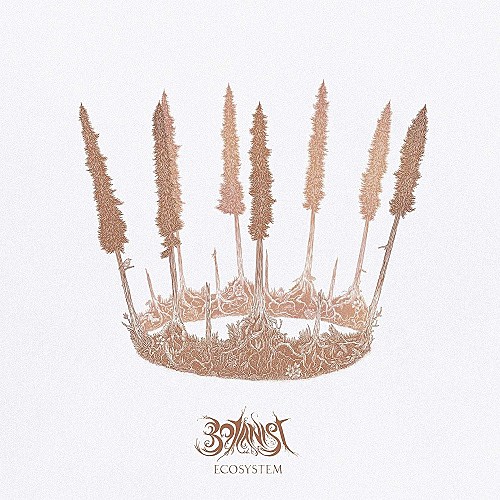
…
A Botanist album is a contract. The listener agrees to leave our shared world behind and enter into the Verdant Realm, the lush sanctuary of The Botanist — an entity channeled by founding member Otrebor and who serves as the central character of the band’s mythos. From his sacred refuge, and at the behest of the mysterious being Azalea, The Botanist strives to bring about an apocalypse in which humanity is destroyed and the Verdant Realm reigns.
The Botanist dreams of a future where Earth has been reclaimed by intricate and flourishing natural ecosystems. One of these is the towering redwood forests of the Pacific Northwest, which Botanist explore on their upcoming release Ecosystem. Submerse yourself in the album’s closing track “Red Crown,” an exultant homage to the iconic Cascadian giants, with our exclusive premiere.
…
…
For most of its recorded existence, Botanist was a solo project — Otrebor only calling on an assortment of supporting musicians for live performances. Though self-described as a post-black metal (or “green metal”) band and largely adhering to the genre’s songwriting conventions, Botanist eschew traditional instrumentation in favor of a battery of hammered dulcimers, an approach steeped in Otrebor’s background as a percussionist.
In 2017, Otrebor diverged from his solitary approach with Collective: The Shape of He to Come, the first full-band release in the Botanist catalogue. Despite having discarded the “Collective” signifier, Ecosystem is Botanist’s second collaborative record and represents a shared songwriting and recording effort from the group’s current lineup.
Botanist herald the “Red Crown” of the sequoias with shimmering dulcimer flourishes over cascading toms, all of it quickly assembling into soaring rushes of jubilation. The droning vocal performances, monastic and hypnotic in their impassive gravitas, highlight the solemnity of the evoked scene and lend contrast to the irrepressible brightness of the dulcimer.
From the forest floor / Azalea gazes up and smiles / to the trees above / Up to the height of the canopy / And the glory of the red crown.
Bringing Ecosystem to a fulfilling close, “Red Crown” is Azalea’s celebration of this stately and thriving community liberated from human interference: “Flora and fauna / High in the air,” sculpted, housed, and protected by the cresting and resplendent treetops.
Ecosystem showcases Botanist’s most well-rounded sound to date. Even in the album’s frenzied pitches, the dulcimer breathes and glows, the bass gives warm and grounding affirmation, the drums are crisp yet unobtrusive, and the vocals, both clean and otherwise, meet the instruments on a level plane. The thick haze of distortion which previously cloaked the dulcimers now recedes to the barest wisp. Ecosystem allows each element of this truly unique band to shine, echoing the record’s collaborative origins.
…
Botanist will release Ecosystem via Aural Music on October 25th; pre-order the record on vinyl or CD.
…
Support Invisible Oranges on Patreon and check out our merch.
…
]]>
…
The metal spirit can be found everywhere, even anywhere. While there’s a slew of non-metal which, by whatever form it happens to take, still retains strong appeal to the yearning metal spirit within us. Of course, our minds as a whole typically desire and explore a variety of genres; the raw and ethereal impetus, though, to indulge in metal’s extremity is what some non-metal music is really adept at tapping into. It’s a nifty approach, really, scratching the metal scratch but without the usual razor-sharp steel claw. This isn’t to say that any of this non-metal-but-still-sorta-metal was intended to be as such; it’s more of a phenomenon of how we select music based on mood, desire, and other factors, many of which drive us to listen to, well, heavy metal with or without its usual trappings.
“Green metal” project Botanist is a strong name indeed, especially for what we’re talking about here — Dylan Neal, a dulcimer player for Botanist, is the brainchild for dark electronic project Thief. This might immediately bring to mind one thing, but rest assured, it’ll be something much different indeed. Thief is set to release their sophomore full-length Map of Lost Keys later this month, an 11-track doozy of blended atmospherics, slow and somber melodies, and so much more. Check out a new music video for the album’s sixth track “With Love, From Nihil” below.
…
…
This song in particular really echoes within itself: resonating deep, horrible darkness among ominous synthwork and plenty of vocal layering. Other tracks on Map of Lost Keys could be characterized as “more dancy,” though that would imply some type of sensationally dour dance. Perhaps “more groove” would suffice, to help characterize “With Love, From Nihil,” which showcases Thief’s much more experimentally ambient side. And it’s these two poles that Map of Lost Keys marries beautifully: that of the grim retreat into corners, and that of the anxious emergence therefrom. Thief’s work here is surely exemplary, but most will soon find out that this project welcomes gladly the deepest emotional voids metal is known for housing.
…

Map of Lost Keys releases July 26th via Prophecy Productions.
…
Support Invisible Oranges on Patreon and check out our merch.
…
]]>
